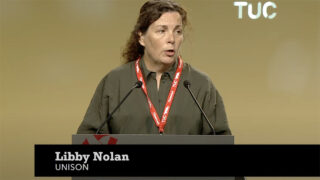The government’s controversial trade union bill, which will seriously curtail unions’ ability to take industrial action, has passed its second reading in the House of Commons.
It went through by 317 votes to 284, a majority of 33, despite fierce criticism from Jeremy Corbyn’s new shadow cabinet, as well as some Tory MPs.
But UNISON general secretary Dave Prentis remains defiant.
Addressing the TUC conference today, Mr Prentis said that “the most draconian legislation in the western world” would not stop the trade unions from “remaining true” to their members.
“It will not stop us striking, standing up for the lives of millions and protecting the vulnerable,” he said. “We will make our union stronger and united, we will build coalitions, and we will resist.”
The bill proposes huge restrictions on peaceful picketing and protests. Striking workers will have to tell their employers of all their plans – including what they will post on Facebook – two weeks before they strike.
For the first time, employers will be able to break strikes by bringing in agency workers to cover for strikers – a move that could have serious safety implications, lead to worse public services, and undermine the right to strike.
Other proposals include attacks on union reps in the public sector, restrictions on how unions collect and spend their money and more unnecessary red tape.
Angela Eagle, the new shadow business secretary, told her fellow MPs: “It saddens me beyond words that we’re here today dealing with the most significant, sustained and partisan attack on six million trade union members and their workplace organisations that we have seen in this country in 30 years.”
Ms Eagle noted that the days lost to strike action had fallen by 90% in the past two decades.
And she called on ministers to work in partnership with unions to increase economic productivity, rather than saddling them with “draconian” restrictions.
“I am a lifelong and proud trade unionist, I believe in social partnership at work, I believe that the right of trade unions to exist and represent members at work is a key liberty in any democracy,” she said.
“I am dismayed that we have a government which believes in attacking trade unions rather than working with them in the spirit of social partnership to improve efficiency, economic efficiency and productivity in our country.”
In a six-hour debate, Labour MPs were joined by members from the SNP, Plaid Cymru and the Green Party in questioning the government’s reasons for its attack on the unions.
They related concerns raised by their constituents as well as their own experiences of trade union activism.
Alex Cunningham, Labour MP for Stockton North, said: “Let us not forget that public sector workers in particular are already under the cosh. The recently announced extension of pay restraint will hurt these workers for a further four years, with most having already been hit pretty hard with poorer deals on pensions, and many others now facing the prospect of losing their jobs as deeper cuts to the public sector continue to bite.”
Chris Stevens, SNP member for Glasgow South West, referred to his decades of UNISON activism and said: “The irony of this bill is that it comes from a political party that believes the answer in today’s world is to deregulate – except in the case of the trade union movement and trade union law.
“The trade union movement is the largest group in civic society that stands up against exploitation,” he added. “The bill will lead to a deterioration of good industrial relations. And it has no support within public opinion. It is designed to reduce civil liberties and human rights.”
While most Tory MPs used the debate to attack trade union rights, some spoke of their concerns about aspects of the bill.
Conservative MP David Davis, who campaigns on human rights issues, said the move on giving names to the police violated the principle of freedom of association and could lead to a “slippery slope”.



